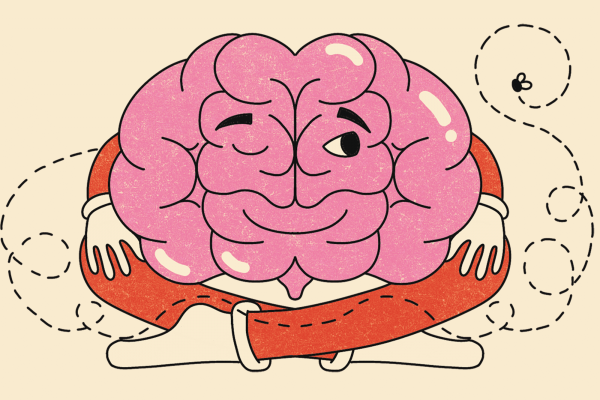READERS, I AM here to tell you about My Mindfulness Journey, but not in an annoying way, guaranteed or your money back. (Please keep reading. It’ll be different this time.)
But, before we get to mindfulness—aware of Carl Sagan’s comment, “If you wish to make an apple pie from scratch, you must first invent the universe”—we will need to invent my brain, or at least take some major psychological detours. Which is appropriate, since ADHD is all about detours.
Oh, wait. Got ahead of myself there. Let’s start at the beginning.
My 2020 experience was a typical one, in that I spent 100 percent of it in my home and/or in untenable personal and professional situations. Switching to working from home utterly destroyed my routines and support systems. The accompanying collapse of my productivity, mood, and mental health prompted my therapist to ask if I’d ever considered that I might have Attention-Deficit/Hyperactive Disorder, or ADHD.
ADHD is a neurodevelopmental disorder that affects attention regulation, executive function, working memory, and a host of other issues—seemingly designed with the express purpose of embarrassing me in front of my boss.
In the months following my diagnosis, I analyzed my habits with the eye of a quality control inspector, dumbstruck by the breadth and scope of this particular unit’s malfunctioning. “How have I survived all this time?” I wondered almost daily. “And surely one of these ‘normal’ people could give me a scrap of their extra dopamine? For a good cause?”
At the same time, I realized: You know what would be a great way to help me learn to live with an overactive and unpredictable brain? Mindfulness.
Did you roll your eyes just now? Because I did. I had rolled my eyes at mindfulness (i.e., awareness of your surroundings and your internal state in a calm and accepting way) for years. Mindfulness is overprescribed in our capitalist system as a way to pretend like the problems caused by that very system are your fault, not theirs. And yet, mindfulness is also a great way to clear a cluttered brain so that insight and calm can find a way in.
This is the part of the story where the universe and the apple pie come together. It turned out, my so-called faulty unit isn’t actually “faulty” after all—it’s just a different model number than the “usual.” The point is, I realized that my “unit” needed regular maintenance to keep it functioning properly—a brain-cleansing, as it were. But I knew that sitting quietly and doing nothing wasn’t going to work for my personal ADHD brain, which, prior to this, I had assumed did not have an “off” switch other than the “sleep” button. (All ADHD experiences are different, and I envy the ADHDers who have no trouble with this. Guess they bought the extended warranty on their unit? But I digress.) So, instead, I started going on mindful walks.
Cut to the present day, where I live a monastic life atop a mountain, dispensing wisdom and asking for nothing in return. Kidding (although I do dispense wisdom, which some plebians call “unsolicited advice”).
Actually, my life looks much the same as before, the difference being that I now have designated time where I can clear my head, ask questions of myself/the universe, and get answers. Or song lyrics. Or daydreams. Or recipe ideas. (I never said my ADHD was gone.)
I’m not here to recommend mindfulness to you—that’s why this story isn’t annoying. (If it is, ask former Sojourners humor columnist Ed Spivey for your money back.) I’m here to recommend, if something is amiss in your life because of an unmet need, that you identify said need and find a solution on your own terms, without shame. From one unique model number to another: Don’t buy the extended warranty. You’re great as is. (Why am I hungry for apple pie?)

Got something to say about what you're reading? We value your feedback!






